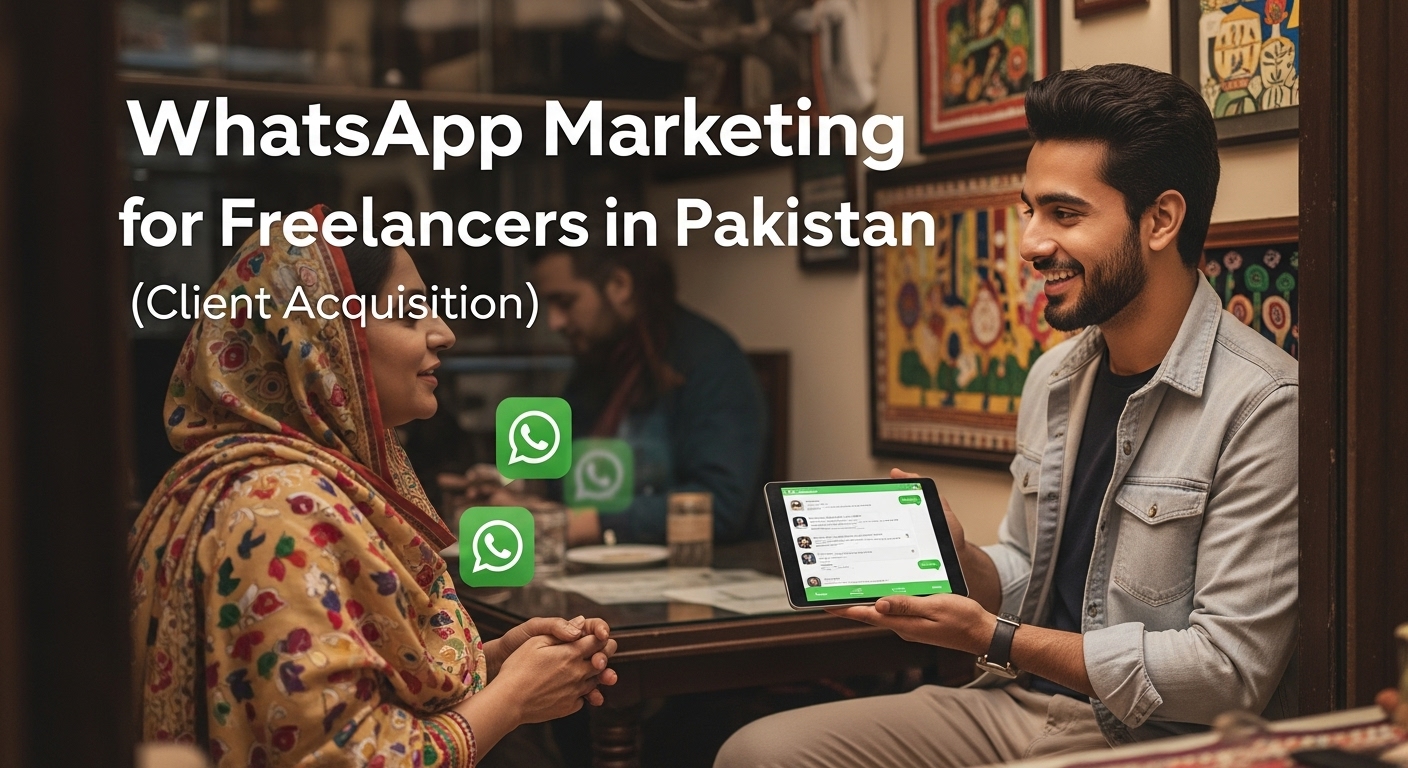WhatsApp marketing is a powerful tool for connecting with potential clients, building relationships, and ultimately, acquiring new work. Forget traditional cold calling or generic emails; WhatsApp offers a direct, personal, and highly effective way to grow your freelance business.
This guide will walk you through every step of leveraging WhatsApp for client acquisition, specifically tailored for the Pakistani freelance market. From setting up your profile to crafting compelling messages and managing your leads, we’ll cover it all. So, let’s dive in and learn how to turn your WhatsApp into a client-magnet!
1. Understand the WhatsApp Landscape in Pakistan
WhatsApp is deeply embedded in daily communication across Pakistan, from personal chats to business interactions. Understanding its widespread adoption and how people use it for business will help you tailor your strategy effectively. Pakistanis often prefer direct messaging over formal emails or calls for initial inquiries.
2. Set Up Your WhatsApp Business Profile
The WhatsApp Business app provides professional tools like a business profile, catalog, automated messages, and labels, which are essential for managing client interactions efficiently and professionally. It separates your personal communications from your business, maintaining a professional image.
- Go to your mobile app store (Google Play Store or Apple App Store) and search for “WhatsApp Business.” Download and install it.
- Register with a dedicated business number. It’s best to have a separate number for your freelance work to keep things organized.
- Complete your business profile:
- Profile Picture: Use a professional headshot or your business logo.
- Business Name: Your freelance service name or your own name, clearly indicating your profession (e.g., “Ahmed — SEO Specialist,” “Fatima — Graphic Designer”).
- Description: A concise yet comprehensive overview of your services. Highlight your unique selling proposition.
- Address: If you have a physical office, include it. Otherwise, you can state “Online Services” or your city/region.
- Business Hours: Set your availability to manage client expectations.
- Email Address: Provide a professional email for formal communication.
- Website/Portfolio Link: This is crucial. Link directly to your online portfolio, LinkedIn profile, or personal website where potential clients can see your work.
Common Mistake: Using your personal WhatsApp for business. This makes it difficult to manage leads, lacks professional features, and can blur personal and professional boundaries. Always use the Business app.
3. Create a Service Catalog (Portfolio)
Utilize the “Catalog” feature within WhatsApp Business to showcase your services, packages, and portfolio items.
A catalog acts as a mini-portfolio directly within WhatsApp. It allows potential clients to browse your offerings easily, understand your scope of work, and see examples of your expertise without leaving the app. This saves time for both you and the client.
- Open WhatsApp Business, go to “Settings” > “Business Tools” > “Catalog.”
- Tap “Add new item” and start adding your services or portfolio pieces.
- For each item:
- Name: A clear title (e.g., “Website Design Package,” “Social Media Content Creation,” “Article Writing – Tech Niche”).
- Price: If applicable, state your price or “Contact for Quote.”
- Description: Detail what the service includes, its benefits, and what clients can expect.
- Images: Upload high-quality images or screenshots of your work. For writers, a visually appealing cover image for a sample article works well. For designers, show off your best designs.
- Link: If you have a dedicated page for that service or portfolio item, include a link.
Tip: Keep your catalog updated with your latest and best work. Group similar services to make it easy to navigate.
4. Craft Engaging Messages and Quick Replies
Develop a set of polite, professional, and engaging messages for different scenarios, and use the “Quick Replies” feature to save time.
Quick, consistent, and professional communication is key to impressing potential clients. Automated or pre-saved messages ensure you respond promptly, even when busy, and maintain a consistent brand voice.
- Greeting Message: Set an automatic greeting message for new chats.
- Example: “Assalam-o-Alaikum! Thank you for contacting [Your Freelance Name/Service]. How can I assist you today?”
- Away Message: If you have specific working hours, set an “Away Message” for when you’re offline.
- Example: “Thank you for your message! I’m currently away and will get back to you during my working hours (Monday-Friday, 9 AM – 5 PM PST). JazakAllah!”
- Quick Replies: Create shortcuts for frequently asked questions or common responses.
- Go to “Settings” > “Business Tools” > “Quick Replies.”
- Examples:
/portfolio:
“Sure, here’s a link to my portfolio: [Your Portfolio Link]”
/rates:
“My rates vary based on the project scope. Could you please provide more details about your requirements so I can give you an accurate quote?”
/services:
“I offer [List 3–4 main services]. You can view my full catalog here: [Link to your WhatsApp Catalog/Website]”
/call:
“Would you like to schedule a quick call to discuss your project in more detail? Please let me know your preferred time and day.”
Tip: Always personalize messages where possible. Even a quick reply can be followed by a personalized question or comment to make the client feel valued.
5. Acquire Client Contacts Ethically
Focus on ethical and permission-based methods to get potential clients to initiate contact with you on WhatsApp.
Sending unsolicited messages (spamming) is against WhatsApp’s policies and can get your number blocked. More importantly, it creates a negative impression and is unlikely to yield good results in Pakistan, where people value direct, permission-based interactions.
- Share Your WhatsApp Link: Generate a WhatsApp direct chat link (wa.me/yournumber) and share it widely.
- Include it in your email signature.
- Add it to your social media bios (LinkedIn, Facebook, Instagram, Upwork, Fiverr profiles).
- Put it on your business cards.
- Mention it in your online advertisements or promotions.
- Call-to-Action on Website/Portfolio: Add a clear “Chat with us on WhatsApp” button or link on your website or online portfolio.
- Social Media Posts: Create engaging posts on platforms like Facebook groups (especially freelance or business groups in Pakistan), LinkedIn, and Instagram, inviting people to WhatsApp you for inquiries.
- Example: “Need a stunning logo for your business? DM me on Instagram or WhatsApp me directly for a quick chat! [Your WhatsApp Link]”
- Networking Events (Online/Offline): When you meet potential clients, actively suggest connecting on WhatsApp for follow-ups.
- Referrals: Encourage satisfied clients to share your WhatsApp contact with others who might need your services.
Important: Never buy contact lists. This is unethical, illegal, and will damage your reputation and lead to your number being blocked.
6. Engage and Nurture Leads
Once a potential client contacts you, engage them promptly, professionally, and value-first. Use WhatsApp’s features to nurture the relationship.
The first interaction is critical. Quick, helpful responses build trust and demonstrate your professionalism. Nurturing leads through valuable content and personalized communication increases the chances of conversion.
- Prompt Replies: Respond as quickly as possible. If you can’t respond immediately, your “Away Message” will manage expectations.
- Personalize: Address the client by name. Reference any specific details they mentioned in their initial message.
- Understand Their Needs: Ask open-ended questions to fully grasp their project requirements, budget, and timeline.
- Example: “Could you tell me a bit more about what you’re looking for in terms of [service]? What are your main goals for this project?”
- Share Relevant Information: Based on their needs, share relevant items from your catalog or portfolio, case studies, or testimonials.
- Offer Value: Instead of just selling, offer helpful advice or insights related to their project. This positions you as an expert.
- Schedule Calls: If the conversation progresses, suggest a brief call to discuss details further. In Pakistan, many prefer a quick call for complex discussions.
- Use Labels: Organize your chats using WhatsApp Business labels (e.g., “New Lead,” “Proposal Sent,” “Follow-up Needed,” “Client – Active,” “Client – Past”). This helps you keep track of your pipeline.
- Follow-ups: Don’t let conversations die. If a client doesn’t respond, send a polite follow-up message after a few days.
- Example: “Just following up on our chat regarding [project]. Have you had a chance to review the information I sent?”
Common Mistake: Over-pitching without understanding the client’s needs. Listen more, talk less initially, and focus on providing solutions.
7. Close the Deal and Onboard Clients
Clearly define project scope, deliverables, pricing, and timelines through WhatsApp, and then transition to a more formal agreement.
While WhatsApp is great for initial communication, formalizing the agreement is crucial for professionalism and legal protection. Clear communication prevents misunderstandings down the line.
- Recap Discussion: Briefly summarize the discussed project scope and deliverables in a WhatsApp message.
- Share Proposal/Contract: Send your formal proposal or contract via email (as a PDF attachment) and notify the client on WhatsApp.
- Example: “I’ve just sent over the detailed proposal for your [project type] to your email. Please let me know if you have any questions after reviewing it.”
- Clarify Payment Terms: Clearly state your payment terms (e.g., upfront percentage, milestones, full payment upon completion). Pakistan often uses bank transfers (IBFT), EasyPaisa, or JazzCash for local transactions.
- Onboarding Instructions: Once the project is confirmed, use WhatsApp to share essential onboarding information, such as what you need from them to start, how you’ll communicate during the project, and any shared documents.
- Create a Broadcast List (with caution): For existing clients, you can create a broadcast list for important updates, but use it sparingly and only for relevant information (e.g., “Wishing you Eid Mubarak!”, “New service offering that might benefit you”). Never use it for unsolicited promotions to new leads.
Tip: Always maintain a friendly yet professional tone throughout the negotiation and onboarding process.
8. Provide Excellent Client Support
Use WhatsApp to provide ongoing, responsive client support and project updates.
Exceptional support builds client loyalty, encourages repeat business, and generates positive referrals. WhatsApp’s immediacy makes it ideal for quick queries and updates.
- Project Updates: Regularly update clients on project progress through short, clear WhatsApp messages.
- Address Queries Promptly: Be available to answer client questions and resolve issues quickly.
- Share Milestones: Inform clients when key project milestones are achieved.
- Feedback Requests: After project completion, gently ask for feedback or a testimonial via WhatsApp.
- Maintain Professionalism: Even if a client is being difficult, maintain a calm and professional demeanor.
Common Mistake: Disappearing after the deal is closed. Consistent communication throughout the project life cycle is vital.
9. Legal and Ethical Considerations in Pakistan
Be aware of data privacy and communication ethics when using WhatsApp for marketing in Pakistan.
While Pakistan’s data protection laws are still evolving, it’s crucial to operate ethically to build trust and avoid potential issues. Respecting privacy is paramount.
- Obtain Consent: Always ensure potential clients have explicitly or implicitly given you permission to message them on WhatsApp. This can be by them initiating the conversation, or by opting-in through a form on your website.
- Avoid Spamming: Do not send unsolicited bulk messages. This can lead to your number being reported and blocked by WhatsApp.
- Data Privacy: Be mindful of the personal data you collect. Avoid asking for unnecessary sensitive information. Pakistan’s Personal Data Protection Bill, 2023, emphasizes consent and lawful processing of data.
- Clear Opt-Out: While less formal on WhatsApp, make it easy for someone to tell you they don’t want to receive messages anymore. Respect their decision immediately.
- Professional Content: Ensure all your messages and shared content are professional, relevant, and not misleading.
Tip: Think of WhatsApp as a direct, personal channel. Treat it with the same respect you’d give a face-to-face conversation.
10. Analyze and Optimize Your Strategy
Regularly review your WhatsApp interactions and client acquisition process to identify areas for improvement.
Continuous optimization helps you refine your messaging, improve response times, and ultimately acquire more clients efficiently.
- Review Chat History: Periodically go through your past client chats. What worked well? What could have been better?
- Track Conversions: Monitor how many initial inquiries convert into actual projects.
- Gather Feedback: Ask clients (and even leads who didn’t convert) for feedback on your communication process.
- Experiment: Try different quick replies, catalog descriptions, or ways of inviting people to WhatsApp you.
- Stay Updated: Keep an eye on new WhatsApp Business features and best practices.
Conclusion
WhatsApp marketing for freelancers in Pakistan isn’t just a trend; it’s a practical and powerful strategy for client acquisition. By setting up a professional profile, showcasing your work effectively, engaging ethically, and providing top-notch support, you can build a strong network of clients and grow your freelance business significantly.
Consistency, professionalism, and a client-centric approach are your biggest assets in the dynamic Pakistani market. Embrace WhatsApp, and watch your freelance career flourish!
Resources
Using WhatsApp for Business and Client Communication
Platforms to Share Your WhatsApp Link
- LinkedIn – For professional networking and sharing your WhatsApp link in your profile or posts.
- Facebook Groups – Join local freelance and business communities to connect with clients and collaborators.
- Upwork / Fiverr – If permitted, you can integrate your WhatsApp link in your profile or project descriptions for easier communication.










